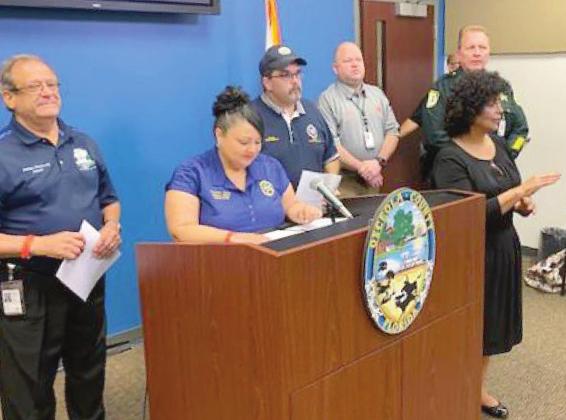An Osceola County judge has ruled in favor of a resident who said the county violated the state’s Government in the Sunshine laws, when a policy group that met during declared emergencies made policy at the start of the 2020 COVID-19 pandemic without informing or inviting the public.
As part of a summary judgment filed earlier this year, the court found meetings of the Executive Policy Group, made up of leadership from the county, its two cities, the School District, health, law enforcement and emergency officials, were subject to Florida’s open-record Sunshine Law. So the county violated that law by not allowing public access to the meetings (Count I of the summary judgment), and were compelled to provide notice of future meetings via a permanent injunction (Count IV).
At those 2020 meetings, curfews and mask mandates were put in place, something Osceola County resident Joshua Meyers said it couldn’t do without the opportunity for public input.
Meyers alleged the EPG met around 5 p.m. on April 13, 2020, and put a curfew and county mask mandate in place in the name of battling COVID-19. Without recourse for public input on that action, Meyers filed suit later that month.
“My endgame was to get those meetings open to the public,” he said. “By that summer policy started coming out of the County Commission instead of the policy group again, which I found awkward.”
The court ruled in favor of the county in Counts II and III of the judgment, in which Meyers asked for records of the EPG meetings, but minutes were not recorded so none exist. Those orders were dismissed with prejudice, meaning they can’t be brought back to court.
According to a public records search, Osceola County spent $102,000 defending this case.
Meyers said he’s “satisfied” in the results.
“It’s hard to get a permanent injunction in this situation,” he said.
Osceola County Attorney Frank Townsend said the county is still looking into how it will proceed, since the verdict came late in the week prior to the Thanksgiving holiday.
“We’ve received the decision and are analyzing our options,” he said.
While part of the court order is that the EPG must hold open meetings, Osceola County in October amended that group, calling it the Executive Advisory Group going forward. It will simply advise the county on what emergency actions to take in the face of things, like impending hurricanes, and put the power of making emergency policies and executive orders back in the hands of the County Commission.
When amending the group, County Manager Don Fisher said the EPG’s 2020 came “without a playbook” for such a pandemic.
“We’re used to weather declarations like hurricanes, when we manage resources for a couple days and then it’s over,” he said. “Any order the Advisory Group makes now will be issued by the Commission. Outside of that, it will function the same way it has before, when it served as an advisory role 98 percent of the time anyway.”
Meyers said there are other aspects of possible Sunshine Law violations by the county he’ll be investigating, such as the Board of County Commissioner’s restriction on public comment to what is on a meeting’s agenda.
“All of this is part of the next fight. I’m not done,” he said.




